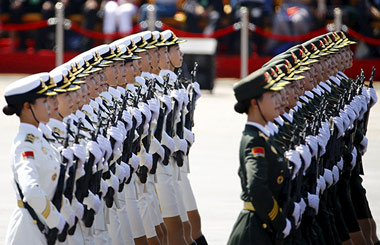New law aims to give charity a lift
Updated: 2016-03-10 07:19
By Luo Wangshu/Cao Yin(China Daily)
|
||||||||
Fung Danlai, a CPPCC National Committee member and a former member of the board of the Tung Wah Group of Hospitals, said: "Just as many international NGOs play important roles in helping governments take care of people in need in their countries, it should be the same in China. Charitable organizations should play their roles to care for the underprivileged," she said .
"Hong Kong has the Tung Wah Group of Hospitals with a history of 150 years, which is the oldest and the largest charitable organization in Hong Kong. Not a single Hong Kong family can say they have never received help from the Tung Wah Group. This is what a non-profit organization should be; the government's right-hand man, helping people in need," she said.
A comprehensive legal framework will be an essential factor in improving transparency and funding for social organizations in the Chinese mainland, according to Fung: "Charitable organizations and the people involved should follow the law. It must be planned correctly. Charitable organizations should be run scientifically so they use donations correctly and help people."
Kan, from the NPC, said the complicated registration procedures for charitable organizations have discouraged both individuals and organizations from joining the sector. The new law has been drafted to reduce red tape and simplify the entry procedure. It also includes a number of favorable tax policies for charitable organizations, and will provide tighter supervision.
"That's a good thing. After all, the donated money is not the organizations' money, so they cannot use it as they want. The public has a right to know whether the money is being used effectively," he said.
According to Li Yuling, from the China Charity Federation, the new law will streamline administration of the sector. "All social organizations are currently required to register with the civil affairs departments, but they also have to register with a related government department, which acts as their supervisor. That's very inconvenient. The new law will change that, which is good news."
Li Jing, from the One Foundation, believes the legislation will give organizations greater independence. "There is no doubt that the coming charity law will be excellent news and a milestone in the improvement of philanthropy in China. The draft specifies that charitable foundations and donors will be allowed to enter into agreements about administrative costs," he said.
Under the current legislation, the cost of administering individual donations, which includes salaries of staff members, cannot account for more than 10 percent of the total annual donation. For example, only 50 yuan of an annual donation of 500 yuan can be set aside for administrative costs. The new law is likely to allow the parties to reach a bilateral agreement on the proportion of a donation that can be used to pay salaries and other expenses.

 Top 10 economies where women hold senior roles
Top 10 economies where women hold senior roles
 Cavers make rare finds in Guangxi expedition
Cavers make rare finds in Guangxi expedition
 'Design Shanghai 2016' features world's top designs
'Design Shanghai 2016' features world's top designs
 Cutting hair for Longtaitou Festival
Cutting hair for Longtaitou Festival
 Southeast Asia experiences rare total solar eclipse
Southeast Asia experiences rare total solar eclipse
 Farmer couple finds wealth in raising peacocks
Farmer couple finds wealth in raising peacocks
 Google's AI takes on Go champion Lee Sedol in Seoul
Google's AI takes on Go champion Lee Sedol in Seoul
 New Year paintings decorate cottage walls in spring
New Year paintings decorate cottage walls in spring
Most Viewed
Editor's Picks

|

|

|

|

|

|
Today's Top News
What ends Jeb Bush's White House hopes
Investigation for Nicolas's campaign
Will US-ASEAN meeting be good for region?
Accentuate the positive in Sino-US relations
Dangerous games on peninsula will have no winner
National Art Museum showing 400 puppets in new exhibition
Finest Chinese porcelains expected to fetch over $28 million
Monkey portraits by Chinese ink painting masters
US Weekly

|

|







